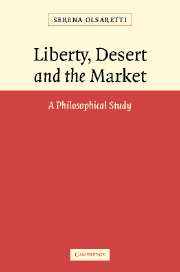Book contents
- Frontmatter
- Contents
- Acknowledgements
- Introduction
- 1 Desert and justifications of the market
- 2 Incentive payments and compensatory desert
- 3 Productive contributions and deserved market rewards
- 4 Liberty and entitlements in the libertarian justification of the free market
- 5 The moralised defence of the free market: a critique
- 6 The free market, force and choice: beyond libertarians and their critics
- Conclusions
- Bibliography
- Index
1 - Desert and justifications of the market
Published online by Cambridge University Press: 22 September 2009
- Frontmatter
- Contents
- Acknowledgements
- Introduction
- 1 Desert and justifications of the market
- 2 Incentive payments and compensatory desert
- 3 Productive contributions and deserved market rewards
- 4 Liberty and entitlements in the libertarian justification of the free market
- 5 The moralised defence of the free market: a critique
- 6 The free market, force and choice: beyond libertarians and their critics
- Conclusions
- Bibliography
- Index
Summary
INTRODUCTION
The idea that people deserve to be paid for the work they do is a familiar one in common thinking about justice, and finds support in various arguments put forward by political philosophers who endorse desert. Some argue that entrepreneurs deserve their profits as prizes for their alertness to the misallocation of resources. Others suggest that workers engaged in hazardous and unpleasant jobs deserve their wages as compensation, or as rewards for the effort they have made. Yet others claim that productive contribution makes people deserving of the incomes they earn. These and other claims are offered in defence of the view that at least some incomes are deserved, and that economic desert – namely, desert of monetary benefits – is a principle of distributive justice. That is, the justice of a distribution of incomes among individuals is thought to be at least in part a function of those individuals' deserts.
Different claims of economic desert have different implications concerning the moral status of the market. Some support viewing free market income inequalities as unjust. In this book I leave these claims aside. I am concerned with arguments that purport to show that the distribution of monetary rewards or incomes (where these are taken to refer, broadly, to profits, wages and other earnings) generated by a free market is just because deserved. Broadly speaking, these arguments unfold by defending two main contentions.
- Type
- Chapter
- Information
- Liberty, Desert and the MarketA Philosophical Study, pp. 10 - 38Publisher: Cambridge University PressPrint publication year: 2004



